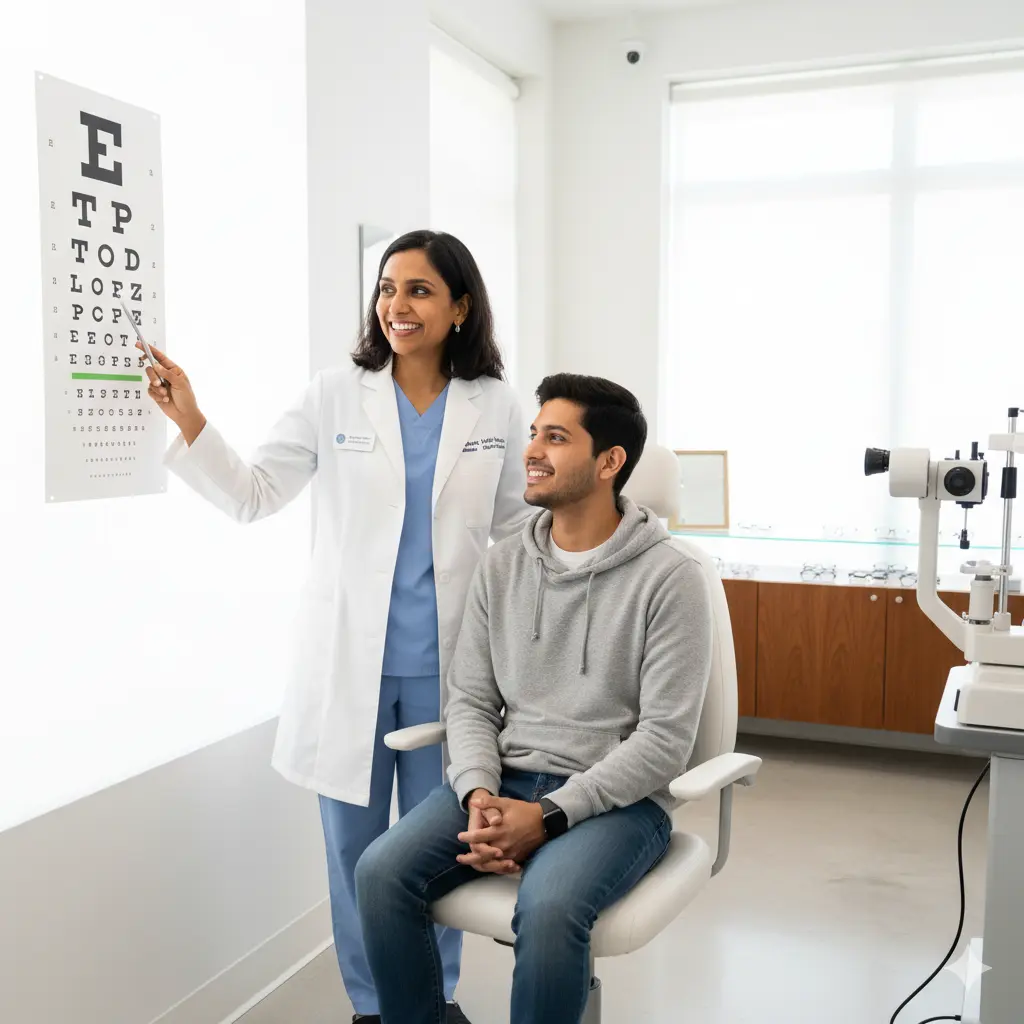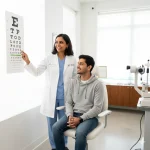What Do You Call an Eye Doctor? (And Why There’s More Than One Answer)
If you’ve ever tried to book an appointment for your eyes, you might’ve wondered—what do you actually call an eye doctor? Is it an optometrist? Ophthalmologist? Optician?
Don’t worry, you’re not the only one confused. I used to think they were all the same too. But after my first pair of glasses and a few eye exams later, I finally learned the difference—and it’s actually pretty interesting.
Let’s clear it up once and for all.
The Quick Answer: It Depends on What You Need
When someone says eye doctor, they could mean one of three professionals:
- Optometrist – checks your vision and eye health, prescribes glasses or contacts.
- Ophthalmologist – a medical doctor who can do everything an optometrist does plus perform eye surgery.
- Optician – helps you fit and adjust your glasses or contact lenses (but doesn’t perform exams or prescribe).
So, if your vision’s getting blurry or you just need a new pair of glasses, you’ll most likely visit an optometrist first. If you have a serious eye condition or need surgery, you’ll see an ophthalmologist.
Optometrist: The Eye Care Expert Most People See First
When most people in the U.S. say, “I’m going to the eye doctor,” they’re usually referring to an optometrist.
Optometrists go through years of specialized training (a Doctor of Optometry degree), but they aren’t medical doctors like ophthalmologists.
They handle most day-to-day eye care, including:
- Vision tests
- Eye exams for glasses or contacts
- Diagnosing common issues like dry eyes or eye strain
- Detecting early signs of diseases like glaucoma or macular degeneration
I remember when I got my first pair of glasses. My optometrist explained everything so clearly—why my vision was slightly off, how the lenses worked, and how often I should come back. It wasn’t rushed or technical, just simple and human. That’s what I appreciate most about optometrists—they’re the front line of eye health care, and they make the experience comfortable.
Ophthalmologist: The Eye Doctor Who’s Also a Surgeon
Now, if your eye exam uncovers something more serious—like cataracts, retinal issues, or severe glaucoma—you’ll likely be referred to an ophthalmologist.
These professionals are medical doctors (MDs or DOs) who specialize in eye and vision care.
They can:
- Perform surgeries (like LASIK or cataract removal)
- Treat complex eye diseases
- Manage long-term vision health
Here’s something interesting for U.S. readers: according to the American Academy of Ophthalmology, there are around 18,000 ophthalmologists practicing across the country. Many work closely with optometrists, creating a smooth care network for patients.
That means your local optometrist might detect something unusual and refer you to an ophthalmologist for further treatment—just like how your family doctor might send you to a specialist.
Optician: The Final Step in Getting Perfect Vision
Once your prescription’s ready, you’ll meet an optician.
Opticians aren’t eye doctors, but they’re the heroes who make sure your glasses fit comfortably and look good (which, let’s be honest, is important too).
Their role includes:
- Helping you choose frames that suit your face and lifestyle
- Adjusting lenses to your prescription
- Fixing and cleaning glasses
In the U.S., many opticians work inside big retail stores like Costco Optical, LensCrafters, or private optometry offices. They’re the ones who’ll adjust your frames if they slip off your nose or feel too tight.
So, if you ever wondered who to thank for your perfectly fitting glasses—the optician deserves the credit.
| Your Eye Need | Who to See |
|---|---|
| Routine vision test | Optometrist |
| New glasses or contacts | Optometrist or Optician |
| Eye pain, infection, or disease | Ophthalmologist |
| LASIK or cataract surgery | Ophthalmologist |
| Frame adjustments or lens repair | Optician |
If you’re not sure where to start, go with an optometrist. They can guide you if a referral is needed.
What to Expect During an Eye Exam
A typical eye exam (especially in the U.S.) takes about 30 to 60 minutes. It’s painless and surprisingly interesting if you like gadgets.
Here’s what usually happens:
- Visual acuity test: Reading letters on a chart to measure clarity.
- Refraction test: Looking through lenses to find your perfect prescription.
- Eye health check: Using light or drops to examine the retina and optic nerve.
- Pressure test: A quick puff of air to screen for glaucoma.
Your optometrist may also discuss your daily screen time, driving habits, or dry eye symptoms. Many Americans now spend over 7 hours a day on screens, so digital eye strain is a common topic in clinics across the U.S.
Common Myths About Eye Doctors
Let’s bust a few myths you’ve probably heard:
- “I have good vision, so I don’t need an eye exam.”
Even if you see clearly, eye exams can detect diseases before symptoms appear. - “Only older people need eye checkups.”
Kids and adults of all ages should get checked regularly—vision changes happen anytime. - “Online vision tests are just as good.”
They can’t check eye health or catch underlying issues, so they’re not a full substitute.
How Often Should You Visit the Eye Doctor?
The American Optometric Association recommends:
- Every 2 years for adults with no symptoms.
- Every year for kids, seniors, or anyone who wears glasses.
If you live in the U.S., your insurance might cover annual exams, especially if you have a vision plan like VSP or EyeMed. It’s worth checking, because regular checkups can save you from bigger problems later.
Taking Care of Your Eyes Between Visits
Even outside the doctor’s office, small habits make a big difference in your eye health.
Try these simple tips:
- Follow the 20-20-20 rule: Every 20 minutes, look at something 20 feet away for 20 seconds.
- Wear sunglasses: Protect your eyes from UV rays, even on cloudy days.
- Eat eye-friendly foods: Carrots are great, but so are leafy greens, fish, and eggs.
- Avoid sleeping in contacts: It increases infection risk.
Good vision isn’t just about reading the bottom line on the chart—it’s about keeping your eyes healthy for life.
FAQ 1: What is the difference between an optometrist and an ophthalmologist?
An optometrist is a healthcare professional who checks your vision, prescribes glasses or contact lenses, and manages common eye conditions.
An ophthalmologist is a medical doctor who can do everything an optometrist does, plus perform eye surgeries and treat complex eye diseases.
FAQ 2: Who should I see for a regular eye exam?
For routine vision checkups or new glasses, see an optometrist. They can assess your eyesight, detect early signs of eye problems, and refer you to an ophthalmologist if you need specialized care.
FAQ 3: How often should I get my eyes checked?
Most adults should get an eye exam every two years.
If you wear glasses, have diabetes, or notice vision changes, go once a year.
Children and older adults should also have yearly eye exams since their vision can change more quickly.
FAQ 4: What is an optician, and do they perform eye exams?
An optician helps you choose, fit, and adjust your eyeglasses or contact lenses—but they don’t perform eye exams or write prescriptions. Think of them as the specialists who make sure your glasses fit comfortably and look great.
FAQ 5: Does insurance cover eye doctor visits in the U.S.?
It depends on your plan. Many vision insurance plans in the U.S.—like VSP or EyeMed—cover annual exams, glasses, and contact lenses.
If you have medical insurance only, it may cover visits to an ophthalmologist for medical eye issues, but not routine exams. Always check your policy before booking.



